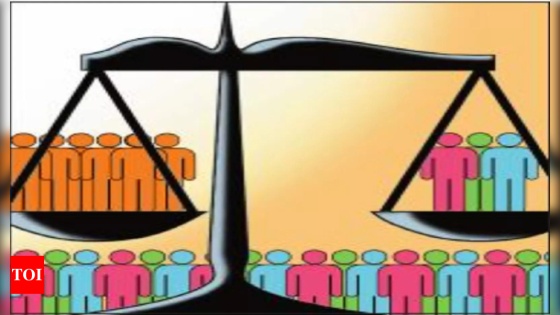According to a 2023 report of the parliamentary committee on the welfare of scheduled castes (SCs) and scheduled tribes (STs), the only category of jobs in ministries and departments of the central government where SCs and STs have a share larger than their quota of 15 per cent and 7.5 per cent respectively are the Group C jobs excluding safai karamcharis and an even larger share among safai karamcharis or sanitation workers. More than one third (37 per cent) of the safai karamcharis employed in central government ministries are from scheduled castes and 7.4 per cent are tribals.
In comparison, in Group A jobs just 13 per cent are SCs and 5.5 per cent are STs. Due to the high representation of SCs and STs in lower categories of jobs, it looks like they more than fill their quota overall 18.4 per cent SCs and 7.4 per cent STs in posts and services under the central government. According to the Parliamentary report, in spite of special drives, relaxation in qualifying criteria and pre-promotional training, ministries or departments were unable to fill the thousands of backlog reserved vacancies.
Thus, even with some ‘dominant’ scheduled castes or tribes taking advantage of the quotas, they remain unfilled year after year. Data available on 45 central universities also shows a similar pattern. SCs constituted under 11 per cent of teaching posts and STs less than 5 per cent . In non-teaching posts, SCs had a share of under 10 per cent and STs just a bit over 5 per cent .
Once again, the shares are lowest in the senior most positions. “This fact is obfuscated by only talking of the overall representation of dalits and tribals in government jobs. There are thousands of unfilled posts in government because the quotas are not being filled. Clearly, despite having a small section of relatively better off SCs, the government is unable to fill the quota. It is estimated that barely 1.9 per cent of SCs earn above 50,000. Most of these would be in government service as historically SCs have no assets, neither land nor businesses,” pointed out M S Nethrapal, an Indian Revenue Service officer who researches issues of Bahujan representation in jobs and education. He added that there was not enough data on the various sub-categories within SC, as data is only collected at a broad level for all SCs as a single category.
The lack of sub-classification leading to the more deprived among SCs or STs missing out would hold true only if the quota was being filled.
If the quota was not being filled, then nobody could be said to be missing out because someone else was getting. However, unlike in jobs/posts, the quotas usually get filled when it comes to seats in educational institutions run by the government, like medical colleges, engineering colleges anduniversities.
Source Agencies



